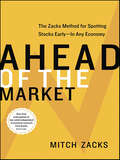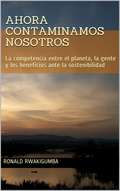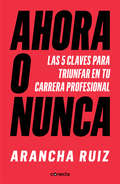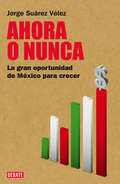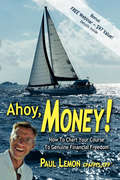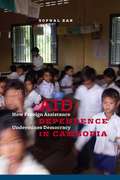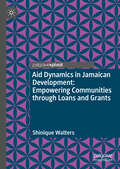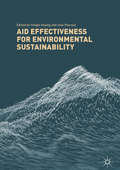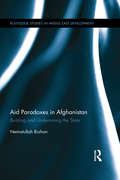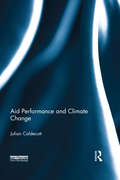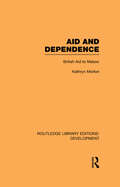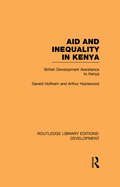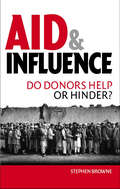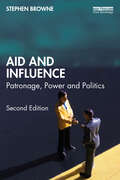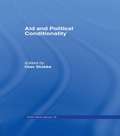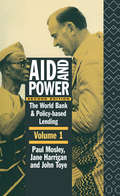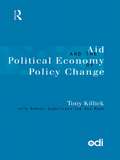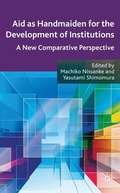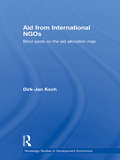- Table View
- List View
Ahead of the Market: The Zacks Method for Spotting Stocks Early—In Any Economy
by Mitch ZacksBeat the Pros at Their Own GameAll too often, you learn about good stocks far too late to profit from the information. By the time you actually buy a stock, professional investors have already been there, bought the stock, driven up the price, and are just waiting to unload it at an inflated price.All That's About to Change. . . .In Ahead of the Market, Mitch Zacks shows investors how they can spot stocks that are poised to take off long before the rest of the crowd learns about them. How? By unlocking the gems of priceless information buried in Wall Street's often self-serving research. Ahead of the Market is the first book, ever, that enables you to profitably use the analyst stock research for which Wall Street firms pay more than one billion dollars annually. Many investors have rightly felt misled in the past by analysts who continued to hype stocks as prices plummeted. You may have even concluded that Wall Street research is totally worthless. But it's not.In Ahead of the Market, Mitch Zacks shows that analysts actually provide a wealth of market-moving information that can generate exceptional returns if interpreted correctly.The key is to use the research produced by Wall Street analysts the same way the professional money managers do.Pioneered by the firm Zacks Investment Research and based on more than twenty years of intensive analysis, the investment strategies revealed in this book are indeed the same ones used by successful professional investors everywhere.In these pages you will learn how to form an investment plan by locating stocks that are poised for price appreciation and avoiding stocks heading for a fall. Zacks shows how you could have prevented being burned when the recent bubble burst, if you had known how to use analyst research correctly and teaches you the rules of the research game so you will not fall victim the next time around. In sum, this book is your guide to picking the right stock at the right time.Mitch Zacks's groundbreaking research provides new insights and new strategies to:Use revisions to analysts' earnings estimates to predict the rise and fall of stock prices Interpret the real meaning behind analysts' stock recommendations Employ the "cockroach" phenomenon and other methodologies to predict earnings surprises before they occur Determine how to react when a company reports earnings and how to profit from "post-earnings announcement drift"Understand and profit from "analyst creep"—the reason that earnings estimate revisions occur incrementally over timeAvoid being duped by the games that companies play with their earnings reportsWhether the economy is healthy or stalled, whether the market is up or down, by focusing on the strategies contained in this book you will always come out ahead. Well-picked individual stocks will always carry the day. Now with Ahead of the Market, you will finally have the same tools institutional investors have and will be able to find great stocks in any market environment.
Ahold versus Tesco--Analyzing Performance
by Penelope Rossano Suraj SrinivasanThe case relates to understanding and comparing the performance of two leading retail companies-Ahold and Tesco. The case introduces the tools of Dupont and Modified Dupont Decomposition. While performance as measured by return on equity has been similar for the two companies, Ahold has had significantly better stock market performance compared to Tesco. Ahold also has a significant amount of cash on its balance sheet leading to low levels of net debt. The case requires students to analyze performance using Modified Dupont Decomposition techniques to assess if firm performance is resulting from operating profitability or from financial leverage and then suggest strategies to improve performance. To perform the modified Dupont Decomposition, students learn how to reformat and condense the balance sheet and income statement to separately measure profitability arising from operating activities and financing activities. Students also see how excess cash holdings can depress profitability and what factors should drive the appropriate level of leverage for a company.
Ahora contaminamos nosotros: La competencia entre el planeta, la gente y los beneficios ante la sostenibilidad
by Ronald RwakigumbaAhora contaminamos nosotros utiliza como título un argumento oído a menudo en las negociaciones sobre el cambio climático, donde las naciones menos desarrolladas sugieren que dado que las naciones desarrolladas generaron la mayor parte de la contaminación del pasado, ahora tienen la obligación histórica de satisfacer los costes asociados con la atenuación del cambio climático o la adaptación al mismo. Simultáneamente, argumentan que dado que la contaminación de la industrialización es una consecuencia inevitable del desarrollo, las naciones en vías de desarrollo han de contaminar para conseguir el crecimiento económico. Decir lo contrario no es nada nuevo, lo que falta en el discurso es explicar claramente el crecimiento ecológico como una alternativa que combina perfectamente algo tan aparentemente opuesto como el desarrollo con los objetivos ecológicos y sociales. Lo que también falta en los discursos es una la estrategia multisectorial del desarrollo sostenible en la que se conjunten las distintas facetas del desarrollo sostenible y se aproveche el enfoque combinado. Este es el viaje que se explica en las páginas de "Ahora contaminamos nosotros". Tras profundizar en la sostenibilidad, el libro presenta el valor del medioambiente y ofrece formas de solucionar los errores de la monetarización del medioambiente, para continuar con una narración general de la acción (¿o es inacción?) climática. También la energía, elemento que juega un papel clave en el funcionamiento de hogares y economías, necesita un buen análisis que se ofrece en uno de los últimos capítulos. Lo que diferencia a teste libro es el enfoque holístico con que conecta los distintos aspectos para trazar una imagen más completa de cómo avanzamos, lo que se explica en el capítulo final sobre desarrollo sostenible, con ejemplos, lecciones y reflexiones. Finalmente, estamos juntos en esto, en nuestro hogar compartido, la Tierra, y la mejor forma de
Ahora o nunca: 5 claves para dar grandes pasos en tu carrera profesional
by Arancha RuizLas oportunidades de éxito están al alcance de todos quienes desarrollen estas 3 habilidades imprescindibles para el profesional del siglo XXI: aprender de forma constante, tejer una red de colaboradores y ser perseverantes. ¿Te sumarías a un proyecto que te apasiona y te recompensa con prestigio y dinero a costa de sacrificar gran parte de tu tiempo y libertad? El «sí» exige un sacrificio personal; el «no» deja pasar un tren que no sabes si volverá. Es una decisión difícil, pues las alternativas no son equivalentes. El éxito de una carrera laboral es el resultado de un cúmulo de disyuntivas profesionales y personales en las que elegimos usando la inteligencia y el cálculo de probabilidades. Hay decisiones excelentes y otras mejorables; decisiones mediocres y malas decisiones. Pero todas son difíciles y siempre se aprende. ¿Y sabes cuál es la peor? La que no se toma. También es de la que uno más se arrepiente. Porque cuando decidimos, asumimos el control sobre nuestra propia vida; nos implicamos emocionalmente y podemos sentir la alegría, el amor, el dolor y la ira. Sentir es vivir. Participar es vivir. Decidir es vivir. Seguro que en alguna ocasión has presentido que te hallabas ante una buena oportunidad, pero no fuiste a por ella. Pero no es momento para lamentaciones, todavía tienes muchas oportunidades por delante. Este libro habla de los errores en clave de aprendizaje y de los aprendizajes en clave de grandes pasos para el éxito. Y explica cientos de historias de personas que, como cualquiera de nosotros, viven aciertos y fracasos cotidianos, y de cómo crearon repetidas oportunidades de calidad para aprovechar los trenes que después pasaron; personas que fueron héroes cuando debían serlo, porque supieron que era su «Ahora». A partir de su amplia experiencia profesional como head-hunter y especialista en marca personal, y con el testimonio revelador de muchas personas que han sabido dar un nuevo impulso a su carrera, Arancha Ruiz ofrece las claves para aprovechar con éxito las oportunidades y vencer frenos y adversarios.
Ahora o nunca: La gran oportunidad de México para crecer
by Jorge Suárez VélezEn el mundo globalizado en el cual vivimos, hay importantes razones para pensar que "las estrellas se están alineando" para darle a este país una oportunidad única que, de ser aprovechada, podría acelerar en forma históricamente relevante el desarrollo de su economía. Advertencia: este libro contiene la agenda económica del nuevo sexenio. Ahora o nunca es un diagnóstico urgente y puntual acerca de la oportunidad histórica que tiene México de acelerar su desarrollo económico. ¿Cómo? A partir de 2008, cuando el crecimiento de los países industrializados disminuyó, naciones como Brasil, Rusia, India y China compensaron el cuadro con su desarrollo vigoroso. Sin embargo, en la actualidad esos motores han comenzado a apagarse y han propiciado una crisis sin precedentes en Europa. Ese proceso alimentará movimientos populistas, nacionalistas y aislacionistas, pero también puede ser un oportuno catalizador para que se adopten medidas impostergables, explica Jorge Suárez Vélez. Tras varios años de capacidad industrial que ha migrado hacia China, explica el autor, la tendencia empieza a revertirse de manera clara conforme la nación asiática pierde competitividad y muchas empresas norteamericanas privilegian la cercanía geográfica con nuestro país. Además, la elección de Brasil como destino favorito de la inversión extranjera en América Latina está cambiando, y muchos inversionistas han puesto sus ojos en México por la relativa superioridad de sus manufacturas, su fortaleza comercial y su menor carga burocrática. Con un estilo ágil, este minucioso análisis de nuestro panorama económico agrega un elemento clave: las enormes posibilidades de la integración energética de Estados Unidos ofrecen un escenario ideal para generar cooperación económica en la región y que México se convierta, contra todos los pronósticos, en el principal beneficiario de la consolidación de ese país.
Ahoy, Money!: How To Chart Your Course To Genuine Financial Freedom
by Paul LemonPaul wrote "Ahoy, Money!" to offer genuine financial freedom to anyone who is willing to honestly look at money and their life. It appeals especially to those who are worried about not having enough to retire or live out the 'American Dream.' What makes "Ahoy, Money!" unique is that it offers an entirely new paradigm or way of seeing money, along with practical guidance as to how to implement this new philosophy. The book truly teaches people how to give money their "attention" rather than their "energy." A few lines from the back cover: "Identify and break free of old money patterns; Discover a new, refreshing way to manage all ten aspects of your personal finances; Assess your overall financial condition; Calculate exactly what you need to save to retire comfortably; Find lasting relief from stress and anxiety over money issues."
Aid Dependence in Cambodia: How Foreign Assistance Undermines Democracy
by Sophal EarInternational intervention liberated Cambodia from pariah state status in the early 1990s and laid the foundations for more peaceful, representative rule. Yet the country's social indicators and the integrity of its political institutions declined rapidly within a few short years, while inequality grew dramatically. Conducting an unflinching investigation into these developments, Sophal Ear reveals the pernicious effects of aid dependence and its perversion of Cambodian democracy.International intervention and foreign aid resulted in higher maternal (and possibly infant and child) mortality rates and unprecedented corruption by the mid-2000s. Similarly, in example after example, Ear finds the more aid dependent a country, the more distorted its incentives to develop sustainably. Contrasting Cambodia's clothing sector with its rice and livestock sectors and internal handling of the avian flu epidemic, he showcases the international community's role in preventing Cambodia from controlling its national development. <P><P>A postconflict state unable to refuse aid, Cambodia is rife with trial-and-error donor experiments and their unintended consequences, such as bad governance and poor domestic and tax revenue performance—a major factor curbing sustainable, nationally owned growth. By outlining the terms through which countries can achieve better ownership of their development, Ear offers alternatives for governments still on the brink of collapse, despite ongoing dependence on foreign intervention and aid.
Aid Dynamics in Jamaican Development: Empowering Communities through Loans and Grants
by Shinique WaltersAchieving sustainable development goals in Jamaican communities requires addressing persistent obstacles that have hindered progress in the past. This book examines how accessing loans and grants can help communities overcome these barriers, focusing on fostering accountability and sustainability in long-term initiatives. By investigating the impact of these funding sources on communities, it aims to shed light on essential strategies that maximize their benefits for community members. In Jamaica, loans and grants are vital financial tools that support both economic and social development. Loans primarily empower economic growth by providing much-needed capital to local businesses and entrepreneurs, fueling job creation and financial stability. Grants, on the other hand, target social needs and fund community development projects that contribute to sustainable growth. The book presents an integrated approach, demonstrating how the complementary roles of loans and grants can uplift Jamaican communities, strengthening the path toward prosperity and equity. The Book reveals a significant insight: many communities hesitate to utilize loans due to concerns about repayment obligations. This book encourages a shift in perspective, emphasizing that loans, like grants, can play an essential role in meeting community needs and building resilience. Ultimately, this book serves as a resource for policy guidance, offering recommendations that foster community resilience through effective use of both loans and grants. It identifies key challenges and opportunities unique to Jamaica, providing a roadmap that stakeholders can adopt to enhance the impact of these financial resources on community development. Comprehensive analysis highlights ways to ensure these tools drive meaningful change in Jamaican and Caribbean communities, offering a unique and valuable contribution to the discourse on sustainable community development.
Aid Effectiveness for Environmental Sustainability
by Unai Pascual Yongfu HuangThis collection examines the role that foreign aid can play in dealing with the severe global challenge of climate change, one of the most pressing international development issues of the 21st century. Addressing the key threats of rising temperatures, changes in precipitation, coastal erosion and natural disasters, the book considers the implications for policy and future research, particularly in developing countries. Focusing on the worth of foreign aid in ensuring environmental sustainability, this collection consider how it can be used to improve access to sustainable energy, to promote efficient use of energy resources, to improve emission reduction and support the preservation of biodiversity in forests. Advancing our knowledge about foreign aid and climate change, it provides policy recommendations for the donors and recipient country governments. A cutting edge text on one of the most pressing international development issues of this century, this is key reading for all scholars of international development and climate change.
Aid Paradoxes in Afghanistan: Building and Undermining the State (Routledge Studies in Middle East Development)
by Nematullah BizhanThe relationship between aid and state building is highly complex and the effects of aid on weak states depend on donors’ interests, aid modalities and the recipient’s pre-existing institutional and socio-political conditions. This book argues that, in the case of Afghanistan, the country inherited conditions that were not favourable for effective state building. Although some of the problems that emerged in the post-2001 state building process were predictable, the types of interventions that occurred—including an aid architecture which largely bypassed the state, the subordination of state building to the war on terror, and the short horizon policy choices of donors and the Afghan government—reduced the effectiveness of the aid and undermined effective state building. By examining how foreign aid affected state building in Afghanistan since the US militarily intervened in Afghanistan in late 2001 until the end of President Hamid Karzai’s first term in 2009, this book reveals the dynamic and complex relations between the Afghan government and foreign donors in their efforts to rebuild state institutions. The work explores three key areas: how donors supported government reforms to improve the taxation system, how government reorganized the state’s fiscal management system, and how aid dependency and aid distribution outside the government budget affected interactions between state and society. Given that external revenue in the form of tribute, subsidies and aid has shaped the characteristics of the state in Afghanistan since the mid-eighteenth century, this book situates state building in a historical context. This book will be invaluable for practitioners and anyone studying political economy, state building, international development and the politics of foreign aid.
Aid Performance and Climate Change
by Julian CaldecottThe richer countries spend about US$165 billion yearly on overseas aid, mainly to keep human development going. These efforts are undermined by climate change, water-catchment damage, biodiversity loss, and desertification, and their interactions with social systems at all scales, which few aid designs or evaluations fully address. This must change if aid performance is to be improved. Constraints to be overcome include limited understanding of the very complex systems that aid investments affect, and of the ecology behind climate change adaptation and mitigation. Aid Performance and Climate Change targets these problems and others, by explaining how to use multiple points of view to describe each aid investment as a complex system in its own unique context. With examples throughout, it reviews cases, ideas, and options for mitigation using technology and ecology, and for adaptation by preserving resilience and diversity, while exploring related priorities, treaties, and opportunities. Combining an empirical, eye-witness approach with methodological conclusions, this book is an essential resource for those looking to improve aid design and evaluation, and will be a necessary tool in training the next generation of aid professionals to respond to the causes and consequences of climate change.
Aid Scaling Up: Do Wage Bill Ceilings Stand in the Way?
by Gerd Schwartz Annalisa Fedelino Marijn VerhoevenInformation on wage bill ceilings.
Aid and Dependence: British Aid to Malawi (Routledge Library Editions: Development)
by Kathryn MortonFirst published in 1975, in conjunction with the Overseas Development Institute, this study examines the case for and against aid for developing nations, taking the specific example of British aid to Malawi’s economic development since independence in 1964. Kathryn Morton suggests that without Britain’s aid, Malawi’s capacity to develop would have been severely undermined and that aid has not generally inhibited Malawi’s efforts to help itself. The rapid growth of both agricultural and industrial output alongside foreign exchange earnings and avoidance of large-scale urban unemployment and balance of payment problems do not bear out the critics' gloomy predictions. This book does much to counter the critics’ case against aid and raises a number of vital questions in determining the future shape of aid policies for both Britain and other developed countries.
Aid and Fiscal Management
by Timothy Lane Aleš BulìřThis paper focuses on the macroeconomic aspects of fiscal management in aid-receiving countries. Despite the declining share of aid in budgets of donor countries, aid continues to play an important role in many developing countries. The paper first discusses the implications of aid in the economy as a whole and highlights the possibility of Dutch-disease effects of aid. Second, it discusses the implications of aid for short-term fiscal policy management - in particular, how actual or anticipated changes in aid receipts should be reflected in government spending.
Aid and Growth: What Does the Cross-Country Evidence Really Show?
by Raghuram G. Rajan Arvind SubramanianWe examine the effects of aid on growth--in cross-sectional and panel data--after correcting for the bias that aid typically goes to poorer countries, or to countries after poor performance. Even after this correction, we find little robust evidence of a positive (or negative) relationship between aid inflows into a country and its economic growth. We also find no evidence that aid works better in better policy or geographical environments, or that certain forms of aid work better than others. Our findings, which relate to the past, do not imply that aid cannot be beneficial in the future. But they do suggest that for aid to be effective in the future, the aid apparatus will have to be rethought. Our findings raise the question: what aspects of aid offset what ought to be the indisputable growth enhancing effects of resource transfers? Thus, our findings support efforts under way at national and international levels to understand and improve aid effectiveness.
Aid and Inequality in Kenya: British Development Assistance to Kenya (Routledge Library Editions: Development)
by Gerald Holtham Arthur HazelwoodThis reissue, first published in 1976, considers the rapid rate of economic growth in Kenya, combined with its apparent political stability, to determine whether or not this is indeed a case of ‘growth without development’ and, if so, where the responsibility for aid lies in this situation. The book concludes that while Kenyan growth has not been to an ideal pattern, accompanied by an increase in inequality, there is little or no reason to believe that living standards have not improved. It examines the impact of aid on Kenya’s progress at both the microeconomic and macroeconomic level and provides an institutional study of the impact of aid on Kenyan Government policy formation and administration and a discussion of British aid’s political purposes and influence in Kenya. The authors conclude that some of the effects predicted by the critics of aid are visible, but that the net effect on general living standards has been strongly positive, concluding that the problems constitute a case for improving aid procedures, but not against aid itself.
Aid and Influence: Do Donors Help or Hinder?
by Stephen BrowneAid is always a means of influence: political, commercial, military and security-related. Some influence is benign, but much of it is coercive, even 'imperialistic'. Given the nature of aid, its effectiveness should be judged not only in developmental terms, but in terms of international relations. Even donors agree that, on both counts, the returns are meagre. This book, drawing on the author's 30 years of field experience, proposes two kinds of solution: donors should climb down from paternalistic central planning practices and support public goods that are neutral and beneficial ? cancellation of debt, fair trade, responsible economic governance, vaccine production, peace-making and peace-keeping. For their part, developing countries should follow the example of the most successful among them: recognize the true costs of 'free' aid, exercise their prerogative to choose their development partners and start paying their own way.
Aid and Influence: Patronage, Power and Politics
by Stephen BrowneThis book turns the argument about aid effectiveness on its head. Since development assistance is inherently self-interested, a source of soft power, political manipulation and commercial opportunity, its real effectiveness could arguably be judged by the strength of donor influence and not by development impact. Its subjective nature means that its impact on development is often weak, mainly short-term and confined to limited and specific contexts. Aid as influence was prevalent during the Cold War era. The connection is equally strong in this century’s newly bipolar world in which the contest is between western donors led by the United States, and China which is spending hundreds of billions of dollars on infrastructure as a means of influence in the global South. Influence permeates both bilateral and multilateral aid and in parallel with official aid, the rise of global philanthropy has seen it taken up by some of today’s billionaires. The response by donors to the growing havoc caused by the three Cs – conflict, climate change and COVID-19 – confirms the main findings of the book, which concludes by outlining what aid without influence would look like. This book draws on the author's 40 years of experience of the aid industry and will be essential reading for development students, practitioners and policy makers alike.
Aid and Political Conditionality (Routledge Research EADI Studies in Development #No. 16)
by Olav StokkeForeign aid has increasingly become subject to political conditionality. In the 1980s some institutions made aid dependent upon the recipient countries' economic policy reforms. Market liberalisation was the primary instrument and objective. In the 1990s such conditionality was brought one step further; aid was now linked to political reforms, affecting recipient countries' governing systems, requiring democracy, human rights and 'good governance'. This volume looks at these developments and considers the conditionality policies of several European aid donors. Such policies are also considered from recipient perspectives, both from the Third World and Russia, and the issue is also considered from a historical perspective.
Aid and Power - Vol 1: The World Bank and Policy Based Lending
by Jane Harrigan Paul Mosley John ToyeWhen the major aid organizations made flows of aid conditional on changes in policy, they prompted an extensive debate in development circles. Aid and Power has made one of the most significant and influential contributions to that debate. This edition has been revised to take account of changes within the World Bank itself and the extension of policy based lending to the formerly socialist economies of east and central Europe.
Aid and the Dutch Disease in Low-Income Countries: Informed Diagnoses for Prudent Prognoses
by Mwanza NkusuFinancial report from the IMF
Aid and the Political Economy of Policy Change
by Tony KillickThis volume looks at the effectiveness of conditionality in structural adjustment programmes. Tony Killick charts the emergence of conditionality, and challenges the widely held assumption that it is a co-operative process, arguing that in fact it tends to be coercive and detrimental to development objectives. Through detailed case studies of twent
Aid as Handmaiden for the Development of Institutions
by Machiko Nissanke Yasutami ShimomuraThrough comparative studies of aid-supported infrastructure projects in East Asia and Sub-Saharan Africa, the book examines how aid could assist development processes by facilitating development of local endogenous institutions.
Aid for Elites
by Mark MoyarCurrent foreign aid programs are failing because they are based upon flawed assumptions about how countries develop. They attempt to achieve development without first achieving good governance and security, which are essential prerequisites for sustainable development. In focusing on the poorer members of society, they neglect the elites upon whose leadership the quality of governance and security depends. By downplaying the relevance of cultural factors to development, they avoid altering cultural characteristics that account for most of the weaknesses of elites in poor nations. Drawing on a wealth of examples from around the world, the author shows that foreign aid can be made much more effective by focusing it on human capital development. Training, education, and other forms of assistance can confer both skills and cultural attributes on current and future leaders, especially those responsible for security and governance.
Aid from International NGOs: Blind Spots on the AID Allocation Map (Routledge Studies in Development Economics)
by Dirk-Jan KochInternational NGOs are increasingly important players within the new aid architecture but their geographic choices remain uncharted territory. This book focuses on patterns of development assistance, mapping, while analysing and assessing the country choices of the largest international NGOs. Koch's approach is interdisciplinary and uses qualitative, quantitative and experimental methods to provide a clear insight in the determinants of country choices of international NGOs. The book aims to discover the country choices of international NGOs, how they are determined and how they could be improved. This work, which uses a dataset created specifically for the research, comes to the conclusion that international NGOs do not target the poorest and most difficult countries. They are shown to be focussing mostly on those countries where their back donors are active. Additionally, it was discovered that they tend to cluster their activities, for example, international NGOs also have their donor darlings and their donor orphans. Their clustering is explained by adapting theories that explain concentration in for-profit actors to the non-profit context. The book is the first on the geographic choices of international NGOs, and is therefore of considerable academic interest, especially for those focusing on development aid and third sector research. Furthermore, the book provides specific policy suggestions for more thought-out geographic decisions of international NGOs and their back donors.
